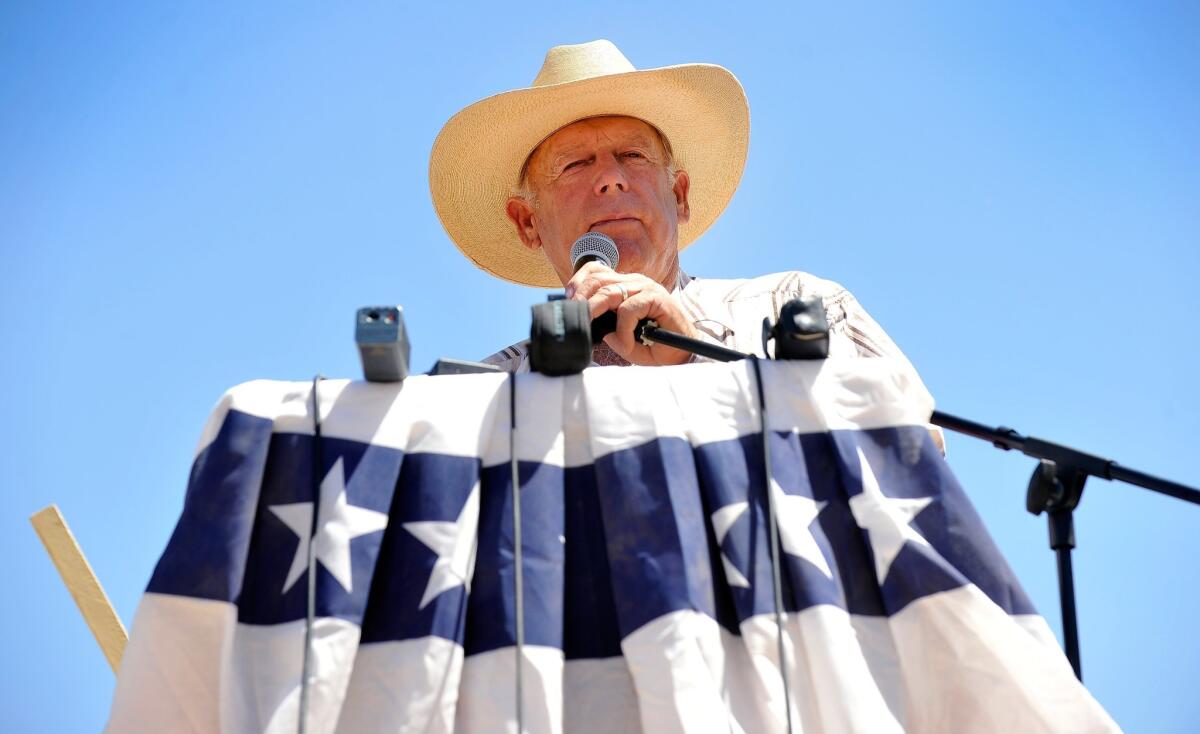Column: How not to pick a hero: The Cliven Bundy story

Every few months, some ordinary person arises from the undifferentiated swarm of Americans and is turned into the poster boy or the poster girl of some political battle du jour.
This time it’s been Cliven Bundy, the Nevada rancher who’s a scofflaw and deadbeat to the feds — who want him to pay $1 million in back fees owed for 20 years of lawless cattle grazing — and to his rancher neighbors, who have paid their super-cheap government fees all along. To the armed anti-government scores who have turned up at Bundy’s place to convince the world that contumaciousness is patriotic, he’s the right message and the right messenger.
It was perfect, until Bundy — in the manner of so many people who find a microphone in front of their faces — couldn’t stop talking (see also, Donald Sterling, under slightly different circumstances). Bundy had kind things to say about hardworking, family-oriented “Mexicans” that weren’t chapter-and-verse tea party thinking but also weren’t a tea party deal-breaker.
But his “I want to tell you one more thing I know about the Negro” remarks — like how African Americans were maybe better off when they were slaves with cotton to pick — suddenly saw some of his higher-profile adherents drop away.
Bundy had praised radio and TV host Sean Hannity as a “hero,” but Hannity, after more or less returning the favor at first, called Bundy’s jawboning “beyond repugnant.”
Sens. Rand Paul (R-Ky.) and Dean Heller (R-Nev.) and Texas Gov. Rick Perry cleared their throats, checked their watches and ducked out to heretofore forgotten appointments to put some distance between themselves and Bundy.
It happens so often that Las Vegas may have a betting line, not on whether these folks will implode but when. The Cliven Bundys of American politics, bit players who are suddenly promoted to center stage, are never as good as their adherents want them to be. They are not empty vessels, but they are flawed ones.
Tawana Brawley’s case briefly became a racial cause celebre in the 1980s. She was found in a trash bag, covered with feces, with “KKK” and jeering slurs written on her body. She said several white men had abducted, raped and sodomized her and written those words. But a grand jury found that none of that was the case, and that she may have done the upside-down writing herself.
The public revulsion against her putative attackers and the outpouring of sympathy for Brawley dried up. Eventually, one of the men she accused, a public prosecutor, won court judgments for defamation against her and the Rev. Al Sharpton, who had hitched his wagon to Brawley’s flickering star and leveraged her story to national prominence as a mostly self-appointed arbiter of race relations. (A Sharpton press release on the Sterling fracas: “I look forward” to speaking with the NBA “to make sure this never happens again.”)
“Joe the Plumber,” an Ohio man lionized by the 2008 GOP presidential ticket for confronting then-candidate Barack Obama about his tax plan, turned out to have Samuel as a first name, and he wound up in a union job at an auto plant in Toledo, a job made possible under the federal bailout of Chrysler.
George Zimmerman was an overenthusiastic neighborhood watchman made over into a “stand your ground” hero for gun enthusiasts after he was charged and then acquitted in the killing of black teenager Trayvon Martin. His subsequent domestic imbroglios and police encounters have rather diminished his heroic potential.
And Norma McCorvey, the deeply troubled “Jane Roe” in Roe vs. Wade, disappointed her fans when she went very public about changing her beliefs about abortion, campaigning against abortion rights and turning away from lesbianism.
The next time — and there will be a next time — one of these populist men or women of the hour looks like the human banner for the right or the left to run up the flagpole, I want every last one of you who’s ready to pick up a gun or a picket sign to do this first:
Click on Netflix or turn on your DVD players and watch “Citizen Ruth.” It is the first feature film Alexander Payne (“Sideways,” “Nebraska”) directed, and it brilliantly skewers both sides of the abortion battle as they angle to turn Ruth — pitch-perfectly played by Laura Dern as a clueless, feckless, drugged-out pregnant woman — into the ideal symbol for abortion-rights or antiabortion forces.
By the end, you almost feel sorry for Ruth, which is how you know it’s a movie and not the real world, the one populated by the Cliven Bundys whom the nation so thoughtlessly and desperately creates.
patt.morrison@latimes.com Twitter: @pattmlatimes
More to Read
A cure for the common opinion
Get thought-provoking perspectives with our weekly newsletter.
You may occasionally receive promotional content from the Los Angeles Times.











